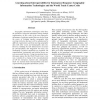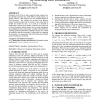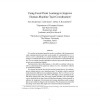603 search results - page 64 / 121 » A theory of learning from different domains |
161
click to vote
AAMAS
2005
Springer
15 years 1 months ago
2005
Springer
Cooperative multi-agent systems are ones in which several agents attempt, through their interaction, to jointly solve tasks or to maximize utility. Due to the interactions among t...
113
Voted
HICSS
2006
IEEE
15 years 7 months ago
2006
IEEE
Geographic information technologies (GIT) have the potential to integrate information among multiple organizations. In fact, some of the most impressive advantages of using geo-sp...
WWW
2007
ACM
16 years 2 months ago
2007
ACM
Documents in the Web are often organized using category trees by information providers (e.g. CNN, BBC) or search engines (e.g. Google, Yahoo!). Such category trees are commonly kn...
115
click to vote
ICASSP
2010
IEEE
15 years 1 months ago
2010
IEEE
Algorithms such as Least Median of Squares (LMedS) and Random Sample Consensus (RANSAC) have been very successful for low-dimensional robust regression problems. However, the comb...
142
click to vote
AAMAS
2011
Springer
14 years 8 months ago
2011
Springer
We consider an automated agent that needs to coordinate with a human partner when communication between them is not possible or is undesirable (tacit coordination games). Specifi...



